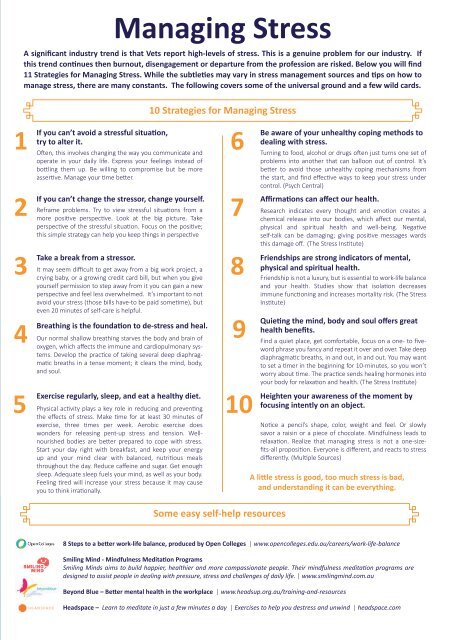UVG-newsletter-FEB18-flip
You also want an ePaper? Increase the reach of your titles
YUMPU automatically turns print PDFs into web optimized ePapers that Google loves.
Managing Stress<br />
A significant industry trend is that Vets report high-levels of stress. This is a genuine problem for our industry. If<br />
this trend continues then burnout, disengagement or departure from the profession are risked. Below you will find<br />
11 Strategies for Managing Stress. While the subtleties may vary in stress management sources and tips on how to<br />
manage stress, there are many constants. The following covers some of the universal ground and a few wild cards.<br />
10 Strategies for Managing Stress<br />
1<br />
If<br />
2<br />
If<br />
3<br />
Take<br />
4<br />
Breathing<br />
5<br />
Exercise<br />
you can’t avoid a stressful situation,<br />
try to alter it.<br />
Often, this involves changing the way you communicate and<br />
operate in your daily life. Express your feelings instead of<br />
bottling them up. Be willing to compromise but be more<br />
assertive. Manage your time better.<br />
you can’t change the stressor, change yourself.<br />
Reframe problems. Try to view stressful situations from a<br />
more positive perspective. Look at the big picture. Take<br />
perspective of the stressful situation. Focus on the positive;<br />
this simple strategy can help you keep things in perspective<br />
a break from a stressor.<br />
It may seem difficult to get away from a big work project, a<br />
crying baby, or a growing credit card bill, but when you give<br />
yourself permission to step away from it you can gain a new<br />
perspective and feel less overwhelmed. It’s important to not<br />
avoid your stress (those bills have-to be paid sometime), but<br />
even 20 minutes of self-care is helpful.<br />
is the foundation to de-stress and heal.<br />
Our normal shallow breathing starves the body and brain of<br />
oxygen, which affects the immune and cardiopulmonary systems.<br />
Develop the practice of taking several deep diaphragmatic<br />
breaths in a tense moment; it clears the mind, body,<br />
and soul.<br />
regularly, sleep, and eat a healthy diet.<br />
Physical activity plays a key role in reducing and preventing<br />
the effects of stress. Make time for at least 30 minutes of<br />
exercise, three times per week. Aerobic exercise does<br />
wonders for releasing pent-up stress and tension. Wellnourished<br />
bodies are better prepared to cope with stress.<br />
Start your day right with breakfast, and keep your energy<br />
up and your mind clear with balanced, nutritious meals<br />
throughout the day. Reduce caffeine and sugar. Get enough<br />
sleep. Adequate sleep fuels your mind, as well as your body.<br />
Feeling tired will increase your stress because it may cause<br />
you to think irrationally.<br />
6<br />
Be<br />
7<br />
Affirmations<br />
8<br />
Friendships<br />
9<br />
Quieting<br />
10<br />
aware of your unhealthy coping methods to<br />
dealing with stress.<br />
Turning to food, alcohol or drugs often just turns one set of<br />
problems into another that can balloon out of control. It’s<br />
better to avoid those unhealthy coping mechanisms from<br />
the start, and find effective ways to keep your stress under<br />
control. (Psych Central)<br />
can affect our health.<br />
Research indicates every thought and emotion creates a<br />
chemical release into our bodies, which affect our mental,<br />
physical and spiritual health and well-being. Negative<br />
self-talk can be damaging; giving positive messages wards<br />
this damage off. (The Stress Institute)<br />
are strong indicators of mental,<br />
physical and spiritual health.<br />
Friendship is not a luxury, but is essential to work-life balance<br />
and your health. Studies show that isolation decreases<br />
immune functioning and increases mortality risk. (The Stress<br />
Institute)<br />
the mind, body and soul offers great<br />
health benefits.<br />
Find a quiet place, get comfortable, focus on a one- to fiveword<br />
phrase you fancy and repeat it over and over. Take deep<br />
diaphragmatic breaths, in and out, in and out. You may want<br />
to set a timer in the beginning for 10-minutes, so you won’t<br />
worry about time. The practice sends healing hormones into<br />
your body for relaxation and health. (The Stress Institute)<br />
Heighten your awareness of the moment by<br />
focusing intently on an object.<br />
Notice a pencil’s shape, color, weight and feel. Or slowly<br />
savor a raisin or a piece of chocolate. Mindfulness leads to<br />
relaxation. Realize that managing stress is not a one-sizefits-all<br />
proposition. Everyone is different, and reacts to stress<br />
differently. (Multiple Sources)<br />
A little stress is good, too much stress is bad,<br />
and understanding it can be everything.<br />
Some easy self-help resources<br />
8 Steps to a better work-life balance, produced by Open Colleges | www.opencolleges.edu.au/careers/work-life-balance<br />
Smiling Mind - Mindfulness Meditation Programs<br />
Smiling Minds aims to build happier, healthier and more compassionate people. Their mindfulness meditation programs are<br />
designed to assist people in dealing with pressure, stress and challenges of daily life. | www.smilingmind.com.au<br />
Beyond Blue – Better mental health in the workplace | www.headsup.org.au/training-and-resources<br />
Headspace – Learn to meditate in just a few minutes a day | Exercises to help you destress and unwind | headspace.com






